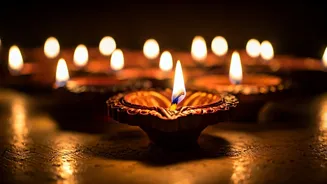Embracing Homegrown Traditions
Diwali 2025 saw a resurgence of homegrown traditions as families sought to reconnect with their roots. Homes were decorated with vibrant rangoli designs
made from colored powders and flower petals. Families lit diyas and candles to illuminate their homes, creating a warm and welcoming ambiance. Traditional sweets like ladoos, barfis, and gulab jamuns were prepared, and shared among family and friends. This year, the focus was on sustainable practices, with many opting for eco-friendly decorations and handmade gifts, embodying a renewed appreciation for Indian heritage and cultural practices.
Celebrating Togetherness and Community
Diwali in 2025 was a time for communities to come together and celebrate. Many housing societies and local groups organized community events, including cultural performances and fireworks displays. The spirit of unity was palpable as neighbors exchanged gifts and shared meals. Events such as 'Nirali Diwali' in Pune, where the LGBTQ+ community celebrated togetherness and belonging, demonstrated the inclusivity that defined this Diwali. These gatherings fostered a sense of belonging and reinforced the importance of celebrating the festival as a collective experience.
The Joy of Sweet Indulgences
A significant aspect of Diwali celebrations always revolves around the delightful array of sweets. Families and friends prepared and exchanged a variety of traditional treats. The consumption of sweets was central to the festivities, and there was a conscious effort to balance this indulgence with healthy choices. Articles were published on how to enjoy Diwali sweets without guilt and offset calories. This included advice on mindful eating, portion control, and incorporating physical activity to maintain a balanced lifestyle. The focus remained on enjoying the festive season while promoting overall well-being.
Air Quality Considerations
In the backdrop of Diwali celebrations in 2025, air quality became a significant concern. Delhi's AQI hit 354 on Diwali morning, with air quality turning 'very poor' across the NCR. Mumbai's AQI rose to 176, with Colaba recording the highest at 266, indicating the widespread impact of fireworks and other activities on air quality. Concerns over air pollution led to calls for responsible celebrations. Awareness campaigns emphasized the use of eco-friendly crackers and the importance of mitigating air pollution, aligning the joy of the festival with environmental consciousness.
The Festival's Legacy
Diwali 2025, with all its celebrations and considerations, underscored the significance of the festival of lights in modern India. It was a time to reflect on traditions, embrace community spirit, and adapt to contemporary challenges like air quality concerns. It highlighted the evolving ways in which Indians celebrated their culture, from celebrating a wide variety of events to fostering community engagement. The festival’s legacy, marked by togetherness, resilience, and a commitment to preserving cultural identity, continued to shine brightly.












